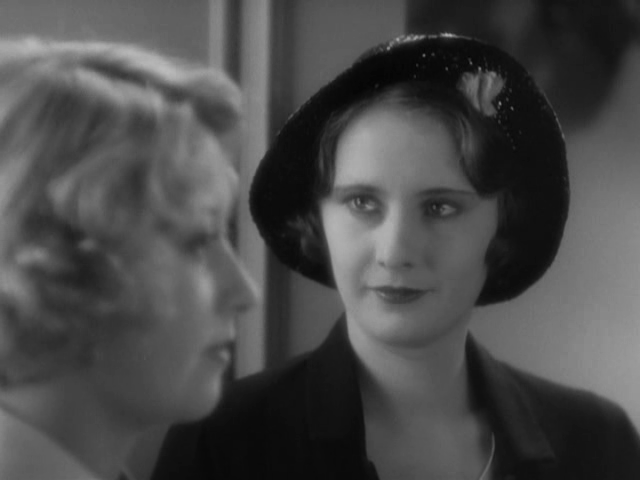CABARET CINEMA: NIGHT NURSE (William A. Wellman, 1931)
Rubin Museum of Art
150 West 17th St. at Seventh Ave.
Friday, July 11, free with $10 K2 minimum, 9:30
212-620-5000
www.rubinmuseum.org/cabaretcinema
 It’s hard to believe that the Hays Code, a set of standards initiated by two religious figures and named after chief censor Will H. Hays, was enacted and enforced, to varying degrees, in Hollywood from 1934 all the way up to 1968. One of the best examples of the racier pre-code films is William A. Wellman’s rarely screened 1931 doozy, Night Nurse. The first of five collaborations between Wellman and Barbara Stanwyck, Night Nurse, based on Dora Macy’s 1930 novel, stars Stanwyck as Lora Hart, a young woman determined to become a nurse. She gets a probationary job at a city hospital, where she is taken under the wing of Maloney (Joan Blondell), who likes to break the rules and torture the head nurse, the stodgy Miss Dillon (Vera Lewis). Shortly after treating a bootlegger (Ben Lyon) for a gunshot wound and agreeing not to report it to the police, Lora starts working for a shady doctor (Ralf Harolde) taking care of two sick children (Marcia Mae Jones and Betty Jane Graham) whose proudly dipsomaniac mother (Charlotte Merriam) is being manipulated by her suspicious chauffeur (Clark Gable). Wellman pulls out all the stops, hinting at or simply depicting murder, child endangerment, rape, alcoholism, lesbianism, physical brutality, and Blondell and Stanwyck regularly frolicking around in their undergarments. It’s as if Wellman is thumbing his nose directly at the upcoming Hays Code in scene after scene. Although far from his best film — Wellman directed such classics as Wings (1927), The Public Enemy (1931), A Star Is Born (1937), Nothing Sacred (1937), Beau Geste (1939), and The Ox-Bow Incident (1943) — Night Nurse is an overly melodramatic, dated, but entertaining little tale with quite a surprise ending. Night Nurse is screening July 11 as part of the Rubin Museum’s Cabaret Cinema series “Movie Medicine: A Film Series about the Healing Factor in Cinema,” being held in conjunction with the “Bodies in Balance: The Art of Tibetan Medicine” exhibition, and will be introduced by Edna Igoe of the New York Professional Nurses Union. The series continues July 18 with Woody Allen’s Sleeper, introduced by psychotherapist Maggie Robbins, July 25 with Arthur Hiller’s The Hospital, introduced by Dr. Kenneth Perrine, and August 1 with Michael Powell and Emeric Pressburger’s Black Narcissus, introduced by award-winning editor Thelma Schoonmaker.
It’s hard to believe that the Hays Code, a set of standards initiated by two religious figures and named after chief censor Will H. Hays, was enacted and enforced, to varying degrees, in Hollywood from 1934 all the way up to 1968. One of the best examples of the racier pre-code films is William A. Wellman’s rarely screened 1931 doozy, Night Nurse. The first of five collaborations between Wellman and Barbara Stanwyck, Night Nurse, based on Dora Macy’s 1930 novel, stars Stanwyck as Lora Hart, a young woman determined to become a nurse. She gets a probationary job at a city hospital, where she is taken under the wing of Maloney (Joan Blondell), who likes to break the rules and torture the head nurse, the stodgy Miss Dillon (Vera Lewis). Shortly after treating a bootlegger (Ben Lyon) for a gunshot wound and agreeing not to report it to the police, Lora starts working for a shady doctor (Ralf Harolde) taking care of two sick children (Marcia Mae Jones and Betty Jane Graham) whose proudly dipsomaniac mother (Charlotte Merriam) is being manipulated by her suspicious chauffeur (Clark Gable). Wellman pulls out all the stops, hinting at or simply depicting murder, child endangerment, rape, alcoholism, lesbianism, physical brutality, and Blondell and Stanwyck regularly frolicking around in their undergarments. It’s as if Wellman is thumbing his nose directly at the upcoming Hays Code in scene after scene. Although far from his best film — Wellman directed such classics as Wings (1927), The Public Enemy (1931), A Star Is Born (1937), Nothing Sacred (1937), Beau Geste (1939), and The Ox-Bow Incident (1943) — Night Nurse is an overly melodramatic, dated, but entertaining little tale with quite a surprise ending. Night Nurse is screening July 11 as part of the Rubin Museum’s Cabaret Cinema series “Movie Medicine: A Film Series about the Healing Factor in Cinema,” being held in conjunction with the “Bodies in Balance: The Art of Tibetan Medicine” exhibition, and will be introduced by Edna Igoe of the New York Professional Nurses Union. The series continues July 18 with Woody Allen’s Sleeper, introduced by psychotherapist Maggie Robbins, July 25 with Arthur Hiller’s The Hospital, introduced by Dr. Kenneth Perrine, and August 1 with Michael Powell and Emeric Pressburger’s Black Narcissus, introduced by award-winning editor Thelma Schoonmaker.
